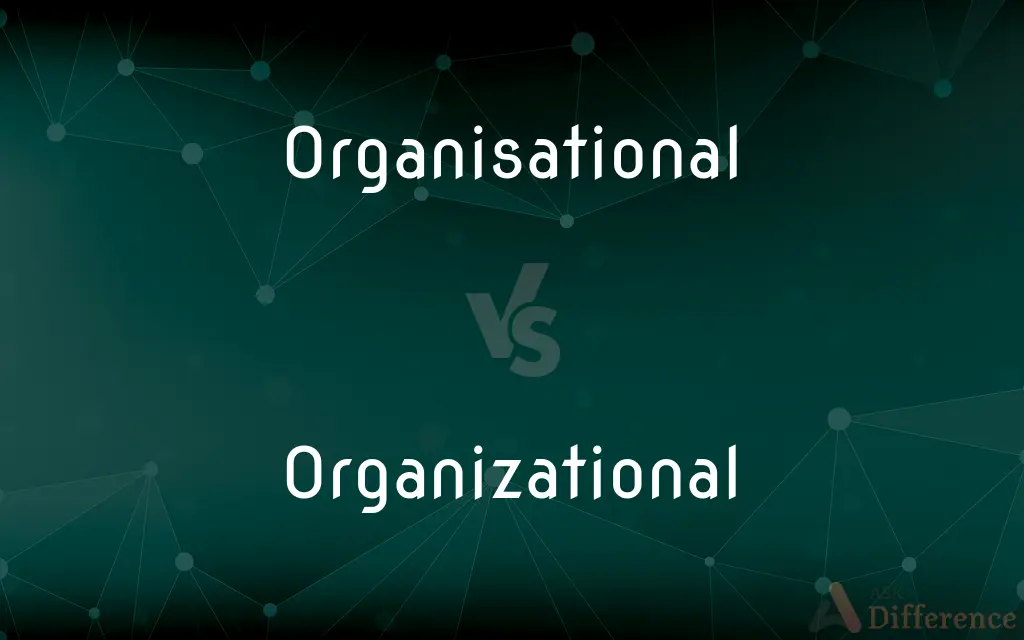Organisational vs. Organizational — What's the Difference?
By Tayyaba Rehman & Maham Liaqat — Updated on March 15, 2024
"Organisational" follows British English spelling, focusing on the structure and function within organizations, while "Organizational" adheres to American English conventions, with the same focus.

Difference Between Organisational and Organizational
Table of Contents
ADVERTISEMENT
Key Differences
Organisational structure, culture, and behavior are key aspects in the study and application of management within businesses and entities in the UK and other countries following British English. On the other hand, organizational structure, culture, and behavior are integral to the study and management of entities in the USA and places where American English is standard.
In literature and professional discourse, "organisational" and "organizational" might appear in texts that adhere to either British or American English norms, respectively. This distinction is important for academic and professional writing, where consistency with either form of English is often a requirement. While the spelling varies, the theories, principles, and applications of organizational studies are universally applicable, transcending linguistic differences.
The choice between "organisational" and "organizational" often depends on the intended audience or the standard spelling conventions of the publication or institution involved. Writers and speakers choose the variant that matches their linguistic context, ensuring clarity and adherence to preferred English usage. Regardless of spelling, the study of organizational or organisational behavior, culture, and structure plays a crucial role in the management and effectiveness of organizations globally.
Despite the spelling difference, the core focus of both terms is on the dynamics, efficiency, and effectiveness within entities like companies, non-profits, and governmental organizations. The distinction is purely orthographic, without any difference in meaning or application. Scholars and professionals in the field of organizational studies explore topics such as leadership, motivation, change management, and organizational culture, irrespective of the spelling variant used.
Comparison Chart
Spelling
Uses an "s" in "-isational"
Uses a "z" in "-izational"
ADVERTISEMENT
Usage
Predominantly used in the UK and countries following British English norms
Commonly used in the USA and regions where American English is standard
Meaning
Refers to aspects related to the structure and function within organizations
Identical in meaning, focusing on the structure, culture, and behavior within organizations
Academic and Professional Context
Used in academic papers, textbooks, and professional documents adhering to British English standards
Used in contexts adhering to American English standards, including academic and professional writings
Global Understanding
Recognized globally, but primarily associated with British English
Recognized globally, with a strong association to American English
Compare with Definitions
Organisational
Pertaining to the structure and functioning within an organization.
The organisational culture at the firm encourages innovation and teamwork.
Organizational
Related to forming organizations or the act of organizing.
Strong organizational skills are essential for a manager.
Organisational
Concerned with the establishment of relationships and roles within an entity.
Effective organisational leadership is key to success.
Organizational
Pertaining to the arrangement and coordination of activities in an entity.
The organizational chart clearly outlines the company's hierarchy.
Organisational
Relating to the process of organizing.
Organisational skills are critical for effective project management.
Organizational
Involving the study of organizations and their management.
She has a degree in organizational psychology.
Organisational
Involving the arrangement of activities and resources.
Organisational restructuring aimed to improve efficiency.
Organizational
Concerning the way in which an organization operates.
Organizational efficiency is crucial for achieving our goals.
Organisational
Associated with the development and management of systems within a group.
Organisational behavior studies how people interact within groups.
Organizational
Referring to the collective structures and processes within a group.
Organizational culture plays a significant role in employee satisfaction.
Organisational
(British spelling) organizational
Organizational
Relating to an organization or the way it is set up
Organizational heads
The need for organizational change
A company's organizational structure
Organizational
Relating to the action of organizing something
She has great organizational skills
Organizational
The act or process of organizing
The organization of the photos did not take long.
Organizational
The state or manner of being organized
The organization of the files could be improved.
Organizational
A manner of accomplishing something in an orderly or efficient way
Your project was hampered by your lack of organization.
Organizational
A group of persons organized for a particular purpose; an association or business.
Organizational
The administrative personnel of such a structure
Contacted the organization with his complaint.
Organizational
Of, relating to, or produced by an organization.
Organizational
Relating to the action of organizing something.
He lacks organizational skills.
Organizational
Of or pertaining to organization; as, organizational structure.
Organizational
Of or relating to an organization;
Organizational structure
Common Curiosities
What is the main difference between "organisational" and "organizational"?
The main difference is spelling: "organisational" follows British English, while "organizational" follows American English.
Is one spelling more correct than the other?
Neither spelling is more correct; the choice depends on the standard conventions of the English variant being used by the writer or speaker.
Does the difference in spelling affect the meaning of "organisational" and "organizational"?
No, the difference in spelling does not affect their meaning. Both terms relate to the structure and function within organizations.
How should I decide whether to use "organisational" or "organizational" in my writing?
Choose based on the variant of English you are using or the preferences of your intended audience or publication guidelines.
Why do British English and American English have different spellings for "organisational" and "organizational"?
The different spellings reflect broader differences in American and British English, which have evolved separately over time, affecting various words, including those ending in "-ise" (British) and "-ize" (American).
Can the use of one spelling over the other impact the readability of a document for international audiences?
While the spelling might indicate the linguistic preference of the author, it should not significantly impact the readability for international audiences familiar with English.
Can "organisational" and "organizational" be used interchangeably?
Yes, they can be used interchangeably, depending on the linguistic context or the preferred English variant of the audience or publication.
Are there any contexts where one variant is preferred over the other?
Yes, in academic and professional contexts, consistency with either British or American English is often required, dictating the choice of spelling.
Do "organisational" and "organizational" have the same applications in business and management?
Yes, both terms are used in the context of business and management with the same applications, focusing on aspects like culture, structure, and behavior within organizations.
How are "organisational" and "organizational" viewed in global English usage?
In global English usage, both variants are accepted and understood, with the choice of spelling often reflecting the geographical or institutional context of the user.
Share Your Discovery

Previous Comparison
Hamlet vs. Settlement
Next Comparison
Pillar vs. PierAuthor Spotlight
Written by
Tayyaba RehmanTayyaba Rehman is a distinguished writer, currently serving as a primary contributor to askdifference.com. As a researcher in semantics and etymology, Tayyaba's passion for the complexity of languages and their distinctions has found a perfect home on the platform. Tayyaba delves into the intricacies of language, distinguishing between commonly confused words and phrases, thereby providing clarity for readers worldwide.
Co-written by
Maham Liaqat











































